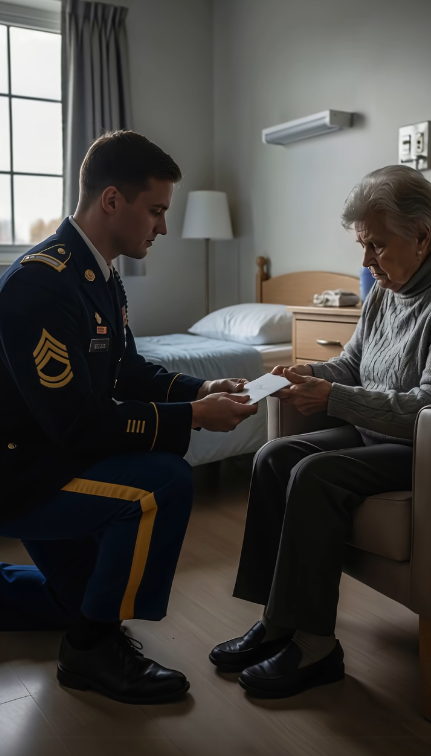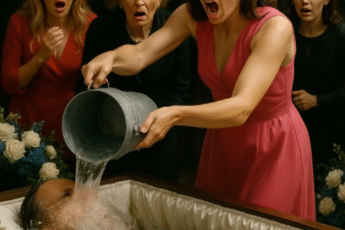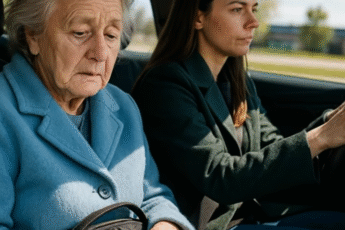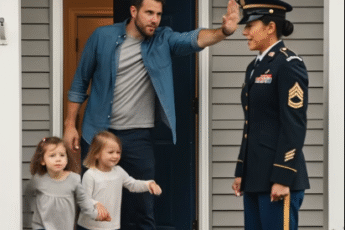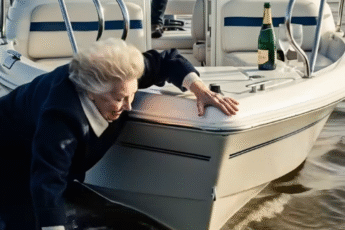The Sunset Manor Nursing Home wasn’t the worst place to spend your final years, but it certainly wasn’t where I had imagined I’d end up. At 78, I found myself in a sterile room with beige walls, a narrow bed, and a view of the parking lot that reminded me daily of all the visitors who never came to see me. My name is Eleanor Whitfield, and I suppose I should be honest about how I ended up here, alone and forgotten by the family I had raised. It wasn’t entirely their fault, though it took me far too long to admit that.
I had always been what people politely called “strong-willed,” and what others, less charitably, described as difficult, critical, and impossible to please. For decades, I had ruled my household with an iron fist wrapped in what I thought was love but was really control. When my daughter, Rebecca, chose to marry a man I deemed beneath her, a kind, hardworking electrician named Tom, I made my disapproval known at every family gathering. When my son, Michael, decided to become a teacher instead of following his father into the family accounting business, I spent years making pointed comments about “wasted potential.”
I criticized Rebecca’s parenting, questioned Michael’s financial decisions, and offered unsolicited advice about everything. I thought I was being helpful, sharing the wisdom of my years. What I was actually doing was slowly, methodically driving away everyone I loved most.
The final break came three years ago, after my husband Walter’s funeral. In my grief and stubbornness, I had refused to sell our large family home. When I fell and broke my hip, they tried again to convince me to move somewhere safer. I accused them of trying to steal my independence, of wanting to put me away so they could get their hands on my house. The words I said that day still echo in my mind: “You’re just waiting for me to die so you can sell everything. Well, I won’t make it that easy for you.”
Rebecca had looked at me with tears in her eyes. “Mom, we just want you to be safe. We love you.” But I was too proud, too hurt, to hear the love in her voice.
After another fall, six months later, I finally agreed to move to Sunset Manor. By then, the damage was complete. My children’s visits became less frequent, then stopped altogether, except for obligatory appearances on holidays. I told myself I didn’t care, but the truth was, I was desperately lonely.
It was Mrs. Patterson, the nursing home’s activity coordinator, who suggested I join the Pen Pal program. “Soldiers overseas often feel isolated,” she explained.
I almost dismissed the idea. What would I have to say to some young soldier? But the alternative was sitting in my room, watching the parking lot. “Fine,” I said, with the enthusiasm of a condemned prisoner.
A week later, I received my first letter from Sergeant Benjamin Torres, stationed in Afghanistan. It was polite but distant. Dear Mrs. Whitfield, Thank you for agreeing to correspond. I’m 24 years old and have been deployed for 8 months. I’m from Chicago originally. I hope you’re doing well. Sincerely, Benjamin Torres.
I almost didn’t respond. But something about the careful formality reminded me of myself. I decided to write back, but with an honesty I hadn’t shown anyone in years.
Dear Benjamin, I wrote, Your letter was very polite, but I suspect you’re about as enthusiastic about this as I was. I’m 78 years old, living in a nursing home, and my family has basically given up on me, probably with good reason. I’ve spent most of my life being critical and difficult, and now I’m reaping what I’ve sown. But if you’re willing to write to a cranky old woman who’s trying to figure out how she got so alone, I promise to be more interesting than my first impression.
His response surprised me. The formal politeness was gone, replaced by something genuine.
Dear Eleanor, he wrote, Your honesty was refreshing. The truth is, I’m scared most of the time, homesick, and questioning the decisions that led me here. I joined the army because I felt lost after college. Instead, I’m just more confused, but in a desert on the other side of the world.
Our correspondence became the highlight of my weeks. He wrote with a maturity that belied his age, and he asked questions that made me think. He wanted to know about my childhood, about being a young woman in the 1960s. In return, I found myself sharing stories I hadn’t told in years.
I wanted to be a writer once, I confessed in one letter. I had notebooks full of stories, but then life happened. Marriage, children, responsibilities. I told myself I’d get back to it someday, but someday never came.
His response was immediate and passionate. It’s never too late to write. You have decades of experiences that younger writers can’t possibly have. Maybe you gave up on your dream, but that doesn’t mean your dream has to give up on you.
His encouragement meant more to me than I could express. For the first time in years, someone saw potential in me, not just problems. As the months passed, our letters became more personal.
I think I’ve forgotten how to love people without trying to fix them, I wrote. I spent so many years pointing out everyone’s flaws that I forgot to appreciate their strengths. My daughter is kind and patient, but all I ever focused on was her choice of husband. My son is passionate about teaching, but I could only see his modest salary. I turned love into criticism, and now I don’t know how to turn it back.
Benjamin’s response was gentle but direct. Maybe the first step is admitting what you just admitted to me. Maybe they need to hear that you see their strengths, that you’re proud of who they’ve become. It might be too late to undo the damage, but it’s never too late to stop making it worse.
It was in my tenth month of correspondence with Benjamin that I began to suspect something. He mentioned details about Chicago that were very specific. A particular restaurant that had closed years ago, a neighborhood festival only locals would know. When he wrote about missing his grandmother’s apple pie and described the recipe in detail, a chill of recognition ran through me. It was my recipe, the one I had taught my daughter Rebecca.
Benjamin, I wrote, my heart pounding, what’s your mother’s name?
His response took longer than usual. Her name is Rebecca. Rebecca Torres. She was Rebecca Whitfield before she married my father. And I think you know exactly who I am, don’t you, Grandma?
I stared at the letter, my hands shaking. Benjamin Torres, my grandson, Rebecca’s oldest son, the boy I had barely known before my criticism had driven his family away. He would be 24 now, exactly the age he’d claimed. My first instinct was anger. How dare he deceive me? But as I sat with the letter, I realized he hadn’t used a false identity at all. Benjamin Torres was his real name. And hadn’t I been equally deceptive? The grandmother in these letters was honest and vulnerable, a version of myself I had never shown him in person.
I spent three days crafting my response.
Dear Benjamin, I finally wrote, I know who you are. I think I’ve known for months, but I was afraid to admit it. These letters have been the best part of my life for almost a year. Through them, I’ve gotten to know my grandson, really know him. And you’ve gotten to know a version of your grandmother that I wish I had been brave enough to show you years ago. I don’t know why you chose to write to me, but I’m grateful you did. You’ve given me a gift I didn’t know I needed: the chance to love you without judgment. I love you, Benjamin. I’ve always loved you, even when I was too proud and stubborn to show it properly.
His response came quickly.
Dear Grandma Eleanor, it began, and I cried just seeing those words. I joined the pen pal program because I was lonely. When I saw your name on the list, I was curious. I wanted to know who you really were underneath all the criticism. For the first time in my life, I felt like I could talk to you without being judged. These letters have meant everything to me. They’ve given me hope that when I come home, maybe we can have a real relationship. I’m coming home next month. I want to come see you, not as your grandson fulfilling an obligation, but as Benjamin, your friend who also happens to be your family. I love you too, Grandma. I always have.
The day of his visit, I was a bundle of nerves. When he walked into the common room, I recognized him immediately. He was taller, broader, wearing his dress uniform, looking confident and mature. But it was his kind, intelligent eyes that I recognized most.
He saw me and smiled. “Hello, Eleanor,” he said, using the name from his letters.
I stood up, my legs shaky, and without thinking, I reached out and hugged him. “I’m so sorry,” I whispered into his shoulder. “I’m so sorry for all the years I wasted.”
“I’m sorry, too,” he said. “I’m sorry it took a war and a pen pal program for us to find each other.”
We talked for three hours, really talked, for the first time. As our visit wound down, he asked, “Would you be willing to see Mom? She misses you terribly, but she’s afraid you’ll just criticize her again. She doesn’t know about our letters.”
“Do you think she would want to see me?”
“I think she’s been waiting for you to want to see her.”
Two weeks later, Benjamin brought Rebecca to visit. I had spent that time rehearsing what I wanted to say. When she walked in, I barely recognized her. She was 52, with silver in her hair and lines around her eyes that spoke of years of laughter and worry. She was beautiful in a way I had never allowed myself to see.
“Hello, Mom,” she said quietly.
“Rebecca,” I said, standing up. “You look beautiful. You look happy.”
She blinked in surprise.
“I owe you an apology,” I began, my voice shaking. “For years of making you feel like nothing you did was ever good enough. I spent so much time trying to fix what I saw as your mistakes that I never told you how proud I was of your successes.”
Her eyes filled with tears.
“Your son and I have been corresponding for almost a year,” I explained. “Through a military pen pal program. We didn’t know who each other were at first. Through our letters, I learned things about Benjamin I never knew. And I hope he learned that underneath all my criticism, there was love.”
Rebecca was crying now. “I thought you hated the choices I made.”
“Oh, sweetheart,” I said, taking her hand. “I was never disappointed in you. I was disappointed in myself. I was afraid, and I thought criticism was protection. I was wrong.”
She threw her arms around me, and we held each other, crying for all the years we had lost. “I missed you so much,” she whispered. “I missed my mom.”
“I’m here now,” I said. “If you’ll have me.”
Over the next hour, we talked in a way we hadn’t since she was a little girl. As they prepared to leave, Rebecca hugged me again. “Can I come back next week? Can we… can we try to be mother and daughter again?”
“I would love nothing more.”
“And maybe,” she added hesitantly, “you’d like to come to dinner sometime at our house.”
The offer was almost too wonderful to believe. “I would be honored,” I said.
Rebecca came to visit every week, sometimes bringing the children. I got to know my grandchildren as the individuals they were, not the perfect beings I had expected them to be. A month after our reunion, she brought up Michael. “He’d like to see you, too,” she said. “He’s been hesitant.”
When Michael walked in the following week, I was struck by how much he looked like his father. “Michael,” I said, my voice catching, “I owe you the biggest apology of all. I spent years trying to change your dreams instead of celebrating them. I was wrong.”
Tears streamed down his cheeks. “I just wanted you to be proud of me.”
“I am proud of you,” I said, taking his hand. “I’m proud that you followed your heart, that you kept writing even when I told you it was impractical. You were braver than I ever was.”
We talked for two hours that day. “Maybe,” he said as he prepared to leave, “we could be writing partners. You could read my work, I could read yours.”
“I would love that more than anything.”
A year after Benjamin’s first visit, our family gathered for Thanksgiving at Rebecca’s house. As I sat at their table, surrounded by laughter and conversation, I realized I was finally becoming part of something beautiful that had been waiting for me all along.
Three months later, I moved into a lovely senior community just ten minutes from Rebecca’s house. Benjamin, now stationed stateside, visited regularly. Michael and I exchanged our writing, offering each other encouragement and feedback.
I am 80 years old now, and I’ve just finished my first collection of short stories. They’re about second chances, about families that find their way back to each other, about the power of words to heal and connect. But the most important story I ever wrote wasn’t fiction. It was the letters I exchanged with a young soldier who turned out to be my own grandson, letters that taught us both that love doesn’t have to be perfect to be real, and that it’s never too late to start over.
